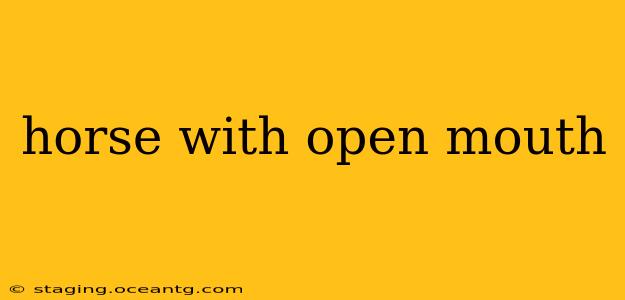Seeing your horse with its mouth open can be concerning. Is it panting from exertion? Is it in pain? Or is it simply a relaxed behavior? Understanding the reasons behind an open mouth in horses requires looking at several factors, from environmental conditions to underlying health issues. This comprehensive guide will help you decipher your horse's open-mouthed communication.
What are the Common Reasons for a Horse to Have Its Mouth Open?
Several factors can contribute to a horse exhibiting an open mouth. Let's explore some of the most common reasons:
1. Overheating and Panting:
This is arguably the most common reason. Horses, unlike humans, don't sweat efficiently across their entire bodies. They primarily sweat on their flanks and shoulders. When they overheat, they pant to dissipate heat through evaporative cooling. Look for other signs of overheating like rapid breathing, elevated heart rate, and profuse sweating in the areas where they sweat.
2. Pain or Discomfort:
An open mouth can be a sign of pain, especially around the mouth, teeth, or throat. Dental issues like sharp points, abscessed teeth, or periodontal disease can cause discomfort that leads to an open mouth. Other sources of pain could include a throat infection, colic, or even lameness (horses sometimes hold their mouths open when experiencing pain in other parts of the body due to the stress and discomfort).
3. Dehydration:
A horse that is dehydrated may have an open mouth due to dry mucous membranes and difficulty breathing. This is often accompanied by sunken eyes, lethargy, and decreased skin elasticity. Always check your horse's hydration level by assessing these factors, as well as monitoring its urine output.
4. Stress or Anxiety:
Just like humans, horses exhibit stress and anxiety in various ways. An open mouth, coupled with other signs such as sweating, restless behavior, and ear position, might indicate that your horse is feeling stressed. This could be due to a variety of environmental factors, such as loud noises, unfamiliar situations, or even interactions with other horses.
5. Neurological Issues:
In some cases, an open mouth can be a symptom of a neurological problem. If your horse consistently exhibits an open mouth without any other apparent reason, consulting a veterinarian is crucial to rule out any underlying neurological disorders.
What Should I Do if My Horse Has Its Mouth Open?
The first step is to observe the context. Is your horse hot and sweaty? Is it acting unusually lethargic or uncomfortable? Is there any visible injury or abnormality?
If your horse is exhibiting other signs of illness, distress, or pain (e.g., rapid breathing, unusual sounds, reluctance to move), contact your veterinarian immediately. Don't hesitate to seek professional help.
If the open mouth seems related to heat, ensure your horse has access to shade, water, and possibly electrolytes to help with rehydration.
If you suspect stress or anxiety is the cause, try to identify and address the source of stress. This might involve adjusting the environment, providing more space, or changing the horse's routine.
Can an Open Mouth Be a Normal Behavior in Horses?
While an open mouth is often associated with discomfort or illness, it's not always a cause for concern. Some horses may simply have their mouths open when relaxed, especially when they are chewing their cud or simply resting. However, if this behavior changes suddenly or is accompanied by other symptoms, always monitor your horse carefully and seek veterinary advice when necessary.
How Can I Prevent Problems Leading to an Open Mouth?
Regular dental checkups are essential for maintaining your horse's oral health and preventing pain or discomfort. Provide adequate water and electrolytes, especially during hot weather or after strenuous exercise. Create a stress-free environment for your horse, minimizing sources of noise, unfamiliar situations, and potential conflict with other horses.
By understanding the possible reasons behind your horse's open mouth, you can be proactive in ensuring its health and well-being. Regular observation and prompt veterinary care are vital in preventing serious health issues. Remember, horses can't tell us what's wrong, so it's up to us to understand their subtle communication cues.
